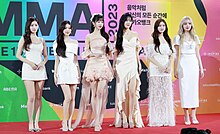
An idol (Korean: 아이돌; RR: Aidol) refers to a type of celebrity working in the field of K-pop in fandom culture in South Korea, either as a member of a group or as a solo act. K-pop idols are characterized by the highly manufactured star system that they are produced by and debuted under, as well as their tendency to represent a hybridized convergence of visuals, music, fashion, and dance.[1] They usually work for a mainstream entertainment agency and have undergone extensive training in dance, vocals, and foreign language. Idols maintain a carefully curated public image and social media presence, and dedicate significant time and resources to building relationships with fans through concerts and meetups.[2][3][4]
- ^ Elfving-Hwang, Joanna (March 5, 2018), "K-pop idols, artificial beauty and affective fan relationships in South Korea", Routledge Handbook of Celebrity Studies, Routledge, pp. 190–201, doi:10.4324/9781315776774-12, ISBN 978-1-315-77677-4
- ^ Caramanica, Jon (October 24, 2011). "Korean Pop Machine, Running on Innocence and Hair Gel". The New York Times. Archived from the original on February 17, 2015. Retrieved September 7, 2012.
- ^ Seabrook, John. "Cultural technology and the making of K-pop". The New Yorker. Archived from the original on October 25, 2012. Retrieved October 30, 2012.
- ^ Sun, Jung (2010). K-Pop Idol Boy Bands and Manufactured Versatile Masculinity: Making Chogukjeok Boys. Hong Kong University Press. doi:10.5790/hongkong/9789888028672.001.0001. ISBN 9789888028672.